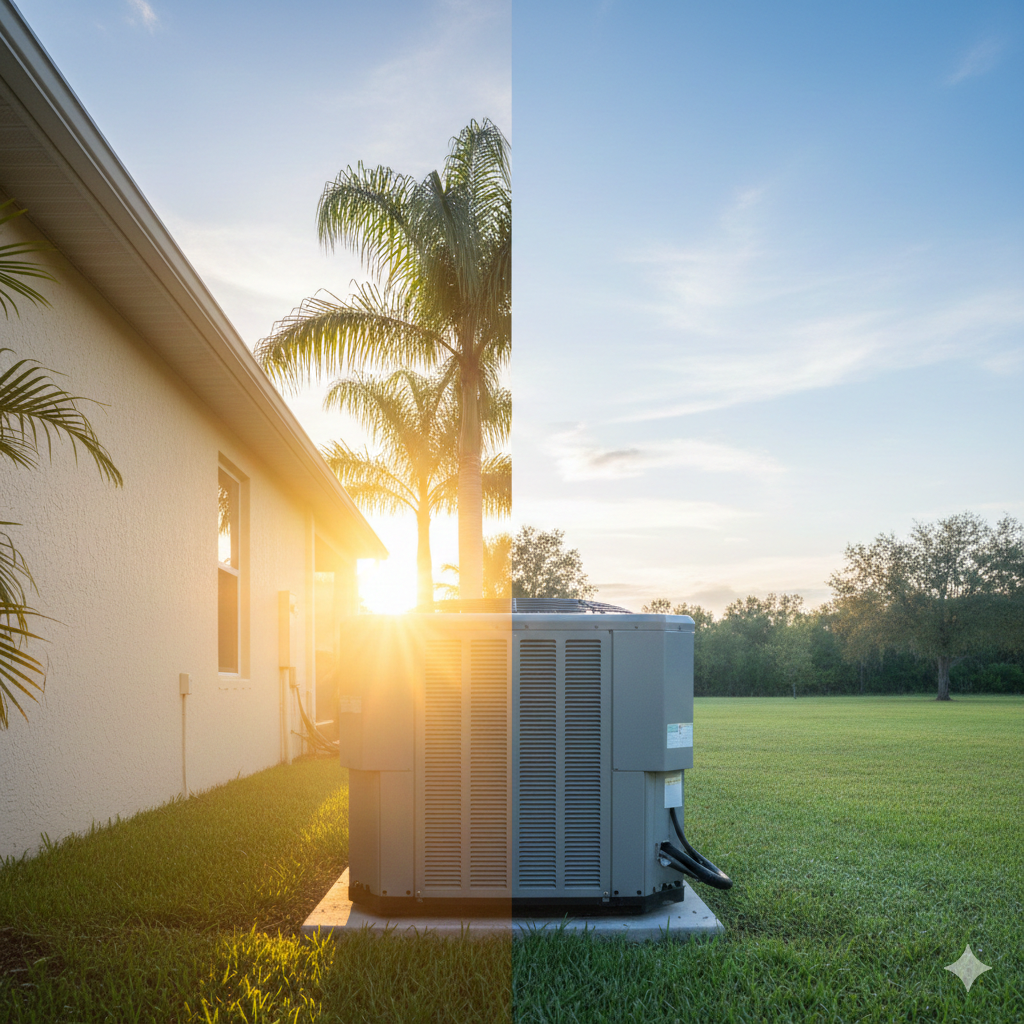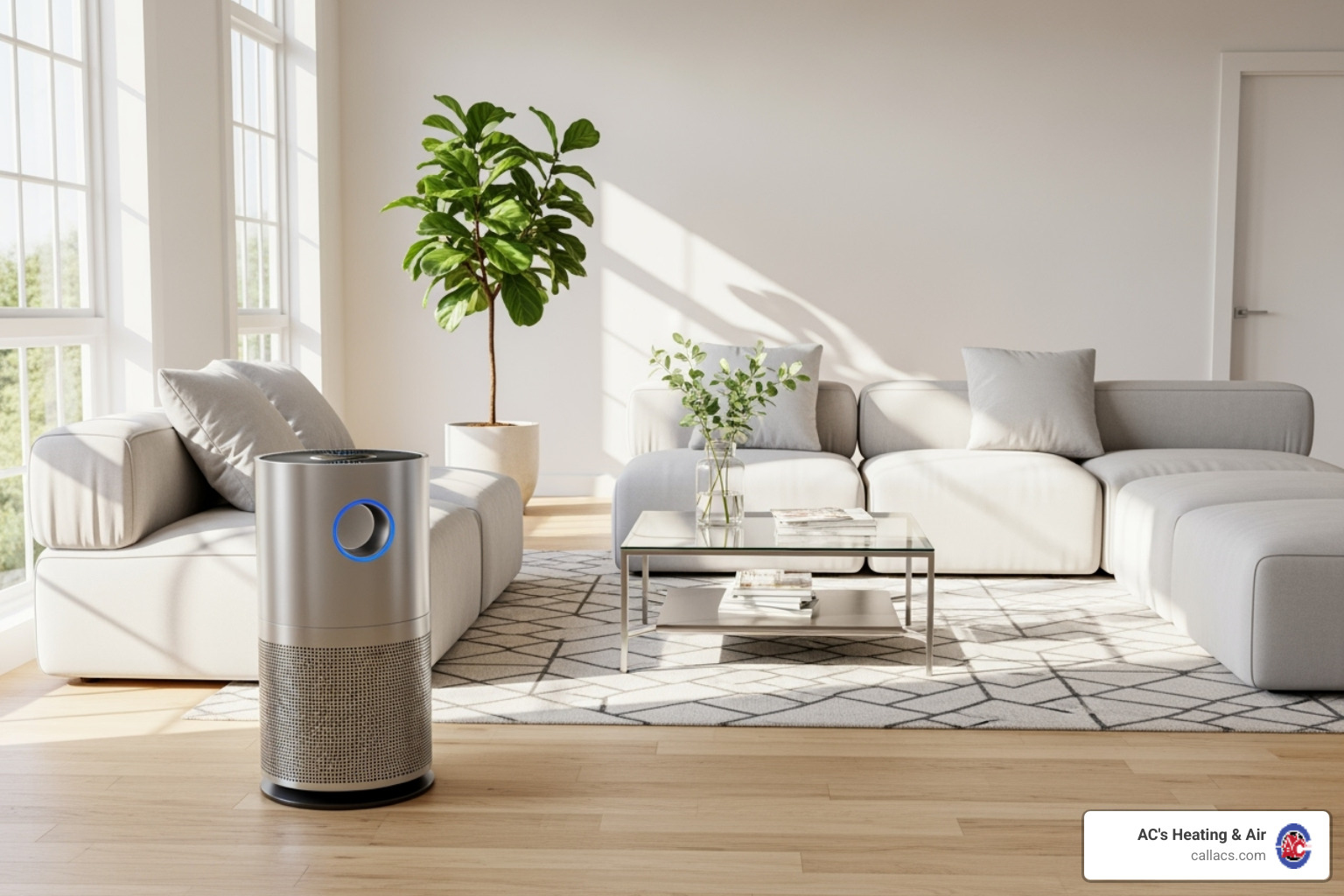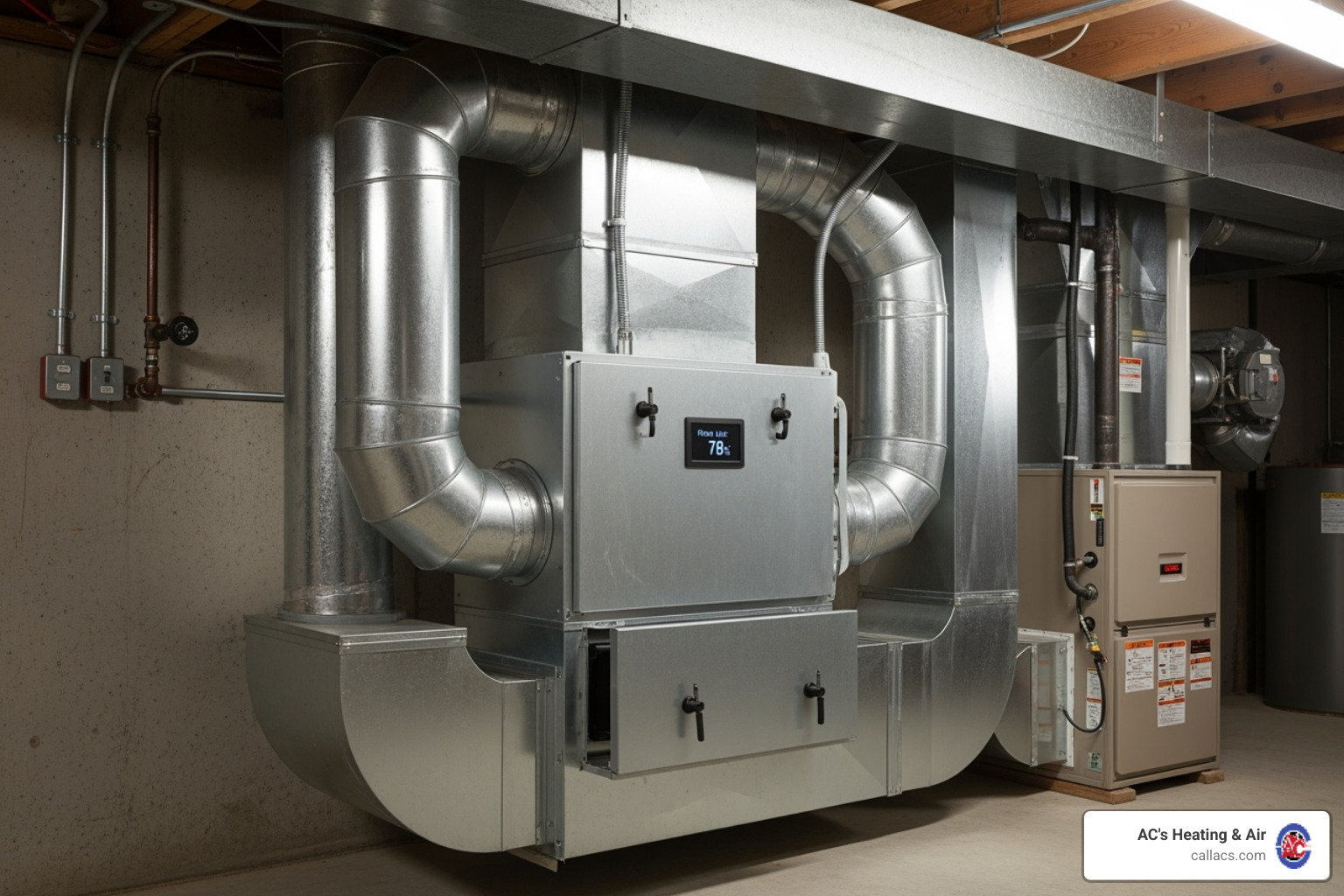AC Not Removing Humidity? Discover the Causes and Solutions

Why AC Not Removing Humidity is a Common Problem in Florida
AC not removing humidity is an issue that many Florida homeowners face, leading to sticky, uncomfortable living conditions despite having the air conditioning running. If you're experiencing this, here are the key factors to check first:
- AC system size: An oversized or undersized AC unit can affect humidity control.
- Thermostat settings: Ensure the fan is set to "AUTO" instead of "ON".
- Dirty evaporator coils: These require regular cleaning.
- Ductwork leaks: Seal any leaks to improve efficiency.
- Refrigerant levels: Low refrigerant can impede moisture removal.
Florida's hot and humid climate makes indoor humidity control crucial for comfort. High humidity levels can make you feel sticky, even if your air conditioner is running. HVAC systems are designed to remove humidity as they cool the air. However, various issues can prevent your AC from dehumidifying properly.
I'm Allen Chenault, owner and founder of AC's Heating & Air LLC. With 8 years of experience in Florida's HVAC industry, I've helped many homeowners resolve humidity issues to improve their indoor comfort.

How Air Conditioners Remove Humidity
Air conditioners play a crucial role in keeping your home comfortable by not just lowering the temperature but also removing excess humidity. Let's break down how this process works:
Evaporator Coils: The Heart of Humidity Removal
When your air conditioner runs, it pulls warm, humid air from your home and passes it over very cold evaporator coils. These coils are essential for both cooling the air and removing moisture.
Here's how it works:- Heat Absorption: The evaporator coils absorb heat from the air, making it cooler.- Condensation: As the warm air hits the cold coils, the moisture in the air condenses into water droplets, just like how a cold drink sweats on a hot day.
Drain Pan and Condensate Drain Line: Where the Water Goes
Once the moisture condenses on the evaporator coils, it needs to be removed from the system to keep your home dry and comfortable.
- Drain Pan: The water droplets formed on the coils drip into a drain pan located below the coils.
- Condensate Drain Line: From the drain pan, the water flows out through a condensate drain line, usually leading outside your home.
If this process is interrupted, your air conditioner might not remove humidity effectively, leading to that sticky, uncomfortable feeling.
Common Issues That Disrupt Humidity Removal
Several issues can interfere with this process, causing your air conditioner to fail at dehumidifying:
- Dirty Evaporator Coils: Dirt acts as an insulator, making it harder for the coils to absorb heat and condense moisture.
- Blocked Drain Line: If the condensate drain line gets clogged, the water can't escape, leading to higher indoor humidity.
- Incorrect Thermostat Settings: If the fan is set to "ON" instead of "AUTO," it can blow the moisture back into your home instead of allowing it to drain away.

Understanding how your air conditioner removes humidity can help you identify and solve issues more effectively. If you encounter problems, it might be time for a professional inspection to ensure everything is working as it should.
Next, let's explore the common causes of AC not removing humidity and how to solve them.
Common Causes of AC Not Removing Humidity
When your AC isn't removing humidity effectively, it can make your home feel sticky and uncomfortable. Let's look at the common causes and their solutions.
Thermostat Fan Setting
One of the simplest yet most overlooked issues is the thermostat fan setting. If the fan is set to ON, it runs continuously, even when the AC isn't cooling. This causes the moisture collected on the evaporator coils to be blown back into your home.
Solution: Change the fan setting to AUTO. This way, the fan only runs during cooling cycles, allowing the moisture to drain away properly.
Dirty Evaporator Coils
Evaporator coils are crucial for both cooling and dehumidifying. However, dirt can act as an insulator, making it difficult for the coils to absorb heat and condense moisture.
Solution: Regular maintenance is key. Have a professional clean the coils at least once or twice a year to ensure optimal performance.
Refrigerant Leaks
Refrigerant is essential for cooling and dehumidifying. A leak can reduce your AC's ability to remove moisture from the air.
Signs of a refrigerant leak:
- Higher humidity levels
- AC struggles to cool your home
- Warm air from vents
- Hissing noises
- Ice on the AC lines or evaporator coil
Solution: If you suspect a refrigerant leak, contact a professional for inspection and repair.
Leaky Ductwork
Leaky ducts can pull humid, dirty air into your home, making it harder for your AC to dehumidify. According to Energy.gov, typical homes lose up to 30% of conditioned air due to duct leaks.
Signs of leaky ductwork:
- Higher energy bills
- Rooms difficult to cool- High indoor humidity
- Excessive dust
Solution: Have a professional inspect and seal the ducts to improve air quality and energy efficiency.
Oversized AC Units
An oversized AC unit can cool your home too quickly, leading to short-cycling. This means the AC doesn't run long enough to remove humidity effectively.
Solution: Consult an HVAC professional to determine if your unit is too large for your home. If it is, consider replacing it with a properly sized unit for better humidity control.
By understanding these common causes, you can take proactive steps to improve your AC's humidity removal capabilities. Next, we'll explore solutions to improve your AC's performance and keep your home comfortable.
Solutions to Improve AC Humidity Removal
Regular Maintenance
Regular maintenance is crucial for keeping your AC system in top shape. It ensures that all components are functioning correctly, which helps in removing humidity effectively.
Key maintenance tasks:
- Coil Cleaning: Dirty evaporator coils can’t condense moisture efficiently. Have a professional clean them at least once or twice a year.
- Filter Replacement: Replace filters every 1-3 months to maintain good airflow and efficiency.
- Professional Check-ups: Schedule regular professional inspections to catch any issues early and keep your system running smoothly.
Proper Thermostat Settings
The thermostat settings can significantly impact how well your AC removes humidity.
- Set to AUTO: Ensure the fan is set to AUTO, not ON. This allows the fan to run only during cooling cycles, giving the moisture time to drain away.
- Cooling Cycles: Proper cooling cycles are essential for dehumidification. Short-cycling, often caused by oversized units, can prevent effective moisture removal.
Duct Sealing
Leaky ductwork can introduce humid air into your home and reduce the efficiency of your AC system.
Benefits of duct sealing:
- Energy Efficiency: Sealed ducts prevent conditioned air from escaping, which reduces energy consumption.
- Improved Air Quality: Properly sealed ducts keep out dust and pollutants, improving indoor air quality.
- Professional Services: Hire a professional to inspect and seal your ducts. This will ensure a thorough job and optimal results.
Correct System Sizing
An oversized AC unit can lead to short-cycling, which hampers humidity removal. Proper sizing is crucial for both cooling and dehumidification.
Steps to ensure correct system sizing:
- HVAC Consultation: Consult with an HVAC professional to determine if your current unit is appropriately sized for your home.
- System Replacement: If your unit is too large, consider replacing it with a correctly sized system. This will improve efficiency and humidity control.
- Efficiency: A properly sized system runs longer cycles, which improves dehumidification and overall comfort.
By incorporating these solutions, you can significantly improve your AC's ability to remove humidity, making your home more comfortable and efficient.

Frequently Asked Questions about AC Not Removing Humidity
Why isn't my air conditioner removing humidity?
If your air conditioner isn't removing humidity, several factors could be at play:
- Dirty Coils: When evaporator coils are dirty, they can't condense moisture efficiently. This dirt acts as insulation, preventing the coils from doing their job. Regular cleaning is essential.
- Thermostat Settings: If the fan is set to ON instead of AUTO, it will keep blowing air even when the cooling cycle is off. This means moisture that has condensed on the coils can evaporate back into your home.
- Refrigerant Leaks: Low refrigerant levels due to leaks can prevent your AC from cooling and dehumidifying properly. Signs of a leak include a hissing noise and ice on the coils. A professional inspection is needed to fix this.
Why is my house still humid even with air conditioning?
Several issues can cause your house to remain humid even when the AC is running:
- Frost Build-up: Ice on the evaporator coils can block airflow and reduce the system's ability to remove humidity. This often happens due to low refrigerant or dirty coils.
- Duct Leaks: Leaky ductwork can pull humid air from attics, basements, or crawl spaces into your home. This not only raises humidity levels but also reduces cooling efficiency.
- Dirt and Debris: Clogged filters and dirty components can obstruct airflow, making it harder for your AC to remove moisture from the air.
Why is my AC not cooling high humidity?
High humidity can make it seem like your AC isn't cooling effectively. Here are some reasons why:
- Energy Spent on Moisture Removal: When humidity is high, your AC has to work harder to remove moisture from the air before it can cool it. This can make the cooling process less efficient.
- Cooling Inefficiency: If your AC is oversized, it will cool the air too quickly without running long enough to remove moisture. This short-cycling prevents effective dehumidification.
By understanding these common issues, you can better troubleshoot why your AC is not removing humidity and take the necessary steps to improve your indoor comfort.
Conclusion
Living in Florida, we know how crucial a well-functioning air conditioner is for comfort. High humidity can make even the coolest room feel sticky and unpleasant. If your AC is not removing humidity, it's more than just an inconvenience; it can affect your health and home.
At AC's Heating & Air, we specialize in professional HVAC services that ensure your system runs efficiently. Our expert technicians can diagnose and fix issues like dirty coils, refrigerant leaks, and ductwork problems. We also offer system sizing consultations to make sure your AC is just right for your home.
Comfort and Efficiency
- Regular Maintenance: Routine check-ups and cleanings keep your system in top shape.
- Proper Settings: Ensuring your thermostat is set to AUTO can make a big difference.
- Professional Services: From duct sealing to system replacement, we have you covered.
Don't let high humidity disrupt your comfort. Contact us today to schedule a service appointment and enjoy a cooler, more comfortable home. Your satisfaction and safety are our top priorities, and all our work is guaranteed.
For all your HVAC needs in Florida, trust AC's Heating & Air. Speak to one of our home comfort specialists by visiting our website. Learn more about our dehumidification systems and how we can help you achieve the perfect indoor climate.
By understanding and addressing the common causes of high indoor humidity, you can make your home a more comfortable place to live. Whether it's regular maintenance, proper thermostat settings, or professional duct sealing, taking these steps can significantly improve your indoor air quality.
For expert advice and reliable service, look no further than AC's Heating & Air. We're here to help you every step of the way.



